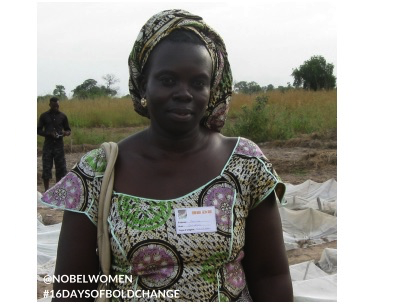. . WOMEN’S EQUALITY . .
An article from Nobel Women’s Initiative
Farmer and organizer for rural women. Mariama is the national coordinator of Nous sommes la solution (We are the solution) in Senegal, a rural women’s movement for food sovereignty, spreading across Senegal, Burkina Faso, Mali, Ghana and Guinea. Through agro-ecology practices, Mariama and her movement work with rural women to take charge of their livelihoods and create an empowering support network for each other.

Can you tell us a little bit about your work?
Our movement was born from consultations between farmers’ organisations and civil society on how to resist agricultural policies imposed by multinational corporations. This movement is Afro-centered and proposes agro-ecology as an alternative to support greater food security in Africa. Women play an indisputable role in agriculture—in the production, and the commercialization of family farming, and in consumption. Our movement is grounded in the vision of an Africa in which rural women are involved in all decision-making and grow, sell and consume the products of their family farms.
How has your movement expanded so far?
We have had a lot of success, mainly because we were able to strengthen the capacity of women leaders to articulate the value of the movement from the very beginning. This allowed us to organize with affected grassroots women, and we now have a platform of at least 100 grassroots associations. We also work with the media, newspapers and radio to spread our message.
(Article continued in right column)
Can the women of Africa lead the continent to peace?
Do women have a special role to play in the peace movement?
(Article continued from left column)
Although the movement was started by women, we have expanded to include men, youth, decision makers, and other people who believe in our work. Today we have a model farm field run by rural women and a store where we sell our products. It’s about turning words into action. There is a lot that we do at the local level but we increasingly believe that it’s also critical to have networks at the international level too, to give greater visibility to the movement. This can be a powerful asset in our advocacy work.
What would you say is the greatest challenge you face?
Women are key actors but their work is not understood and never rewarded. So that is why we must really continue to build women’s capacity to communicate our views and connect with others so they know what it is we’re calling for and what we must do.
Which action would you say is essential for activism?
It is crucial to be connected with other movements in other countries to better know what they’re defending and what they’re working for, and to see how we can link alliances to be stronger. We cannot limit ourselves to what we’re doing. We need to know what others are doing to receive or give lessons to bring us to a more harmonious development.
What does the word “feminism” mean for you?
Feminism simply means social justice in our community. Injustice towards women has been present since our ancestors’ days. Feminism corrects this injustice at the local, national and international level. And that is what really drives us to be and to work with the global feminist movement, to really try to settle this injustice, to value the role women play and their place in our community.
(Thank you to Janet Hudgins, the CPNN reporter for this article)